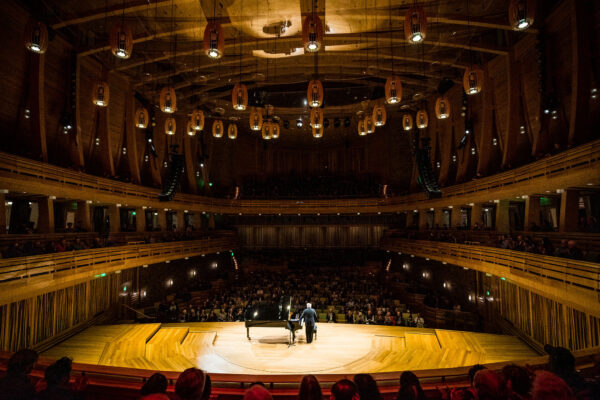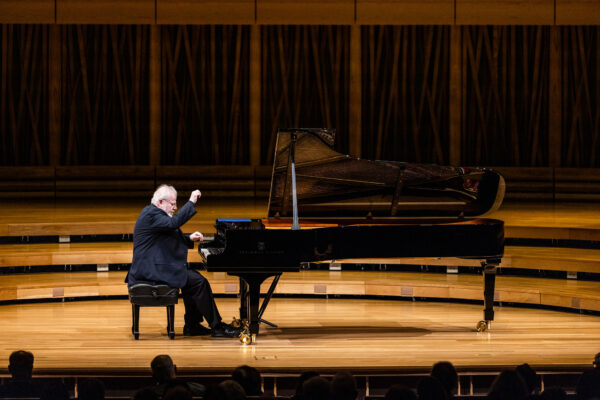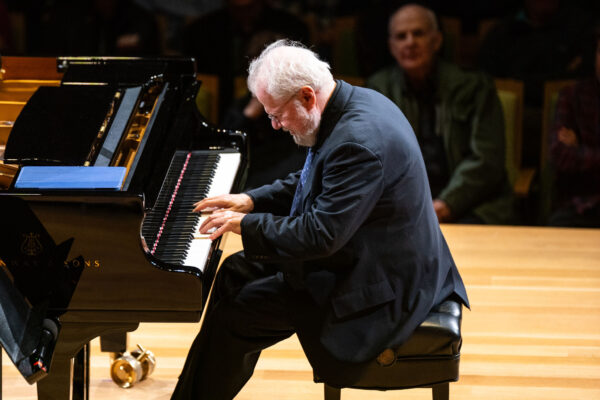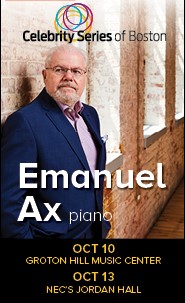FANTASTIC FANTASIAS
Emanuel Ax offered a distinctive series of piano fantasia pieces as part of Boston’s Celebrity Series in beautiful wood-paneled Jordan Hall yesterday afternoon (the program also occurred at Groton Hill Music Center on Oct. 10, 2024). The first part of the program presented Ludwig van Beethoven’s Piano Sonata No. 13 in E-flat Major, Op. 27, no. 1 “Quasi una fantasia,” followed by Arnold Schoenberg’s Drei Klavierstücke and then by Beethoven’s very familiar Piano Sonata No. 14 in C-sharp minor “Quasi una fantasia” (“Moonlight”). Following the intermission, we heard Sechs Kleine Klavierstücke, Op. 11 again by Schoenberg, a piece Ax called “an experiment in miniaturization,” as each of the very brief piano pieces was written to express a different emotional state. This was followed by Fantasie in C Major, Op. 17 by Robert Schumann.
Ax’s warmth and lack of pretension were evident from the moment he stepped onto the stage. After a brief bow, he took his place at the piano and proceeded to play the first Beethoven piece. It is a pleasure to see the way Ax’s hand or hands hover well above the keyboard during the rests in his performance, as though he is “riding” the vibrations of the notes. It was only on completion of that first piece that he addressed the audience, telling us that this year is the 150th anniversary of Schoenberg’s birth. He quoted Leonard Bernstein as saying that Schoenberg is Brahms with “the wrong notes,” and assured us the harmonies were intentionally jarring. The Drei Klavierstücke was indeed filled with unease; it might have been scored as the backdrop for a thriller or a horror movie. The program explains that the piece reflects Schoenberg’s anguish over an affair between his wife Mathilde and his good friend Richard Gerstl that culminated in Gerstl’s death by suicide. According to the program, Schoenberg contemplated ending his own life in the wake of these events, and the piece does seem to end with the rising note of an open-ended question: To be or not to be?
While neither of the Schoenberg pieces are called fantasias, Ax feels they incorporate the feeling Beethoven sought in his own earlier compositions. Schoenberg sought “new paths” and the “creative instant of inspiration.” The first five of the Sechs Kleine Klavierstücke were composed in a single day; the sixth was written as a tribute to Gustav Mahler following his death.
The final piece in Ax’s recital (other than the joyously performed encore, Friedrich Chopin’s Waltz Op 34 No 2) was Robert Schumann’s Fantasie in C Major, Op. 17. This piece began as Schumann’s effort to come to terms with his inability to marry his beloved Clara Weick due to the violent opposition of her father. Over time it evolved from the yearning and torment expressed in the first movement into a larger piece of three movements. The last two movements celebrate and even echo Beethoven as Schumann decided to turn the composition into a fundraiser for the construction of a monument to Beethoven.
Although he has performed more than 30 times in Boston’s celebrity series since his 1980 debut, this was his first performance in the series in five years. He made his debut in the series in 1980, performing a program of Bach trios with cellist Yo-Yo Ma and violinist Leonidas Kavakos. Ax often performs with Ma and others, but this particular appearance was a solo recital that allowed full appreciation of Ax’s utter dedication to his art and the respect he extends to both the work and his audience.
photos taken Oct. 10 at Groton Hill by Robert Torres/Celebrity Series of Boston
Emanuel Ax
Fantasies
Celebrity Series of Boston
New England Conservatory’s Jordan Hall, 50 Gainsborough St, Boston. in Boston
reviewed on October 13, 2024






